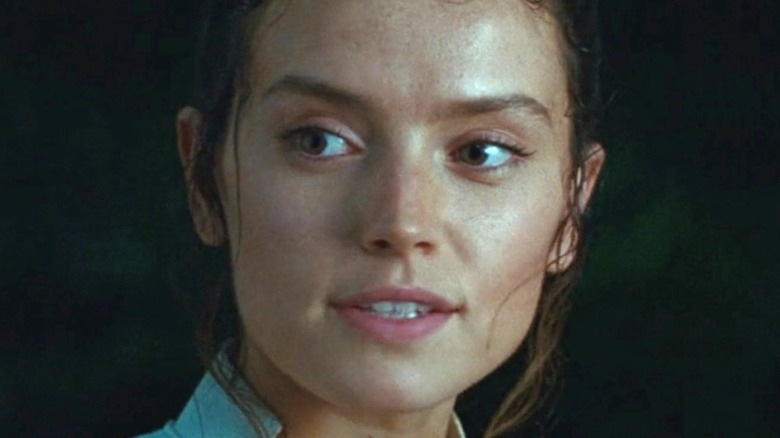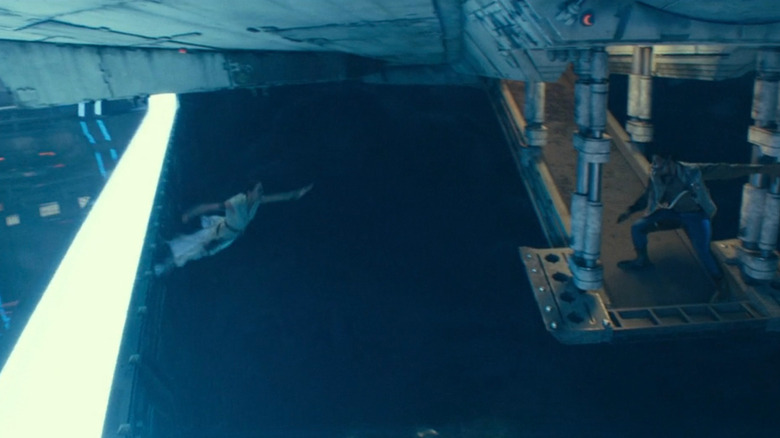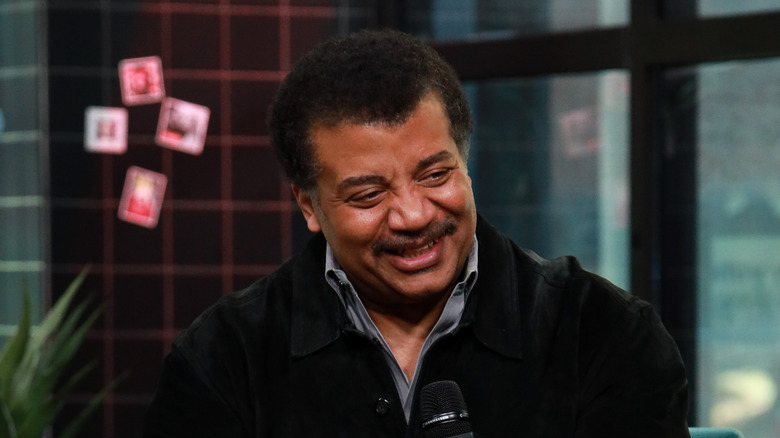The Star Wars: The Rise Of Skywalker Scene Fans Wish They Had Never Filmed
More than two years after its 2019 debut, it seems safe to say that "Star Wars: Episode IX - The Rise of Skywalker" was not the thrilling conclusion that many fans were looking for. During its theatrical release in December 2019, the film managed to gross over $1 billion worldwide (via Box Office Mojo), but it received decidedly mixed reactions from fans and critics alike. Sporting a rotten 52% Tomatometer score on Rotten Tomatoes, the film sits nearby "The Phantom Menace" as the sci-fi fantasy franchise's lowest score on the site.
The third film in Disney's sequel trilogy sees Rey (Daisy Ridley), Finn (John Boyega), Poe (Oscar Isaac), and the rest of the Resistance learn about the miraculous and unexplained resurrection of Emperor Palpatine (aka Darth Sidious) (Ian McDiarmid). Before long, the film becomes a race against time as the team scrambles to put an end to the First Order once and for all.
Many writers criticized the last entry in the sequel trilogy for too often playing things safe. James Luxford of City A.M. wrote, "What should feel like an epic conclusion to a 42-year-old story instead acts as proof that the franchise that has lost its way." However, even before the film was released, one particular moment in a promo caused some fans to lose faith in the force.
Rey's impossible jump through space
A "Rise of Skywalker" TV spot shows Rey escaping Kylo Ren's ship by leaping onto the awaiting Millenium Falcon. This scene birthed countless questions from legions of dedicated "Star Wars" fans. To name only a few... Why do the stormtroopers and Kylo get pushed back but Rey can stand without struggle? Do things not get sucked up by space's vacuum? Are Rey's leaping abilities so good that they defy space's non-gravity-abiding laws?
All of these questions and more were asked in a thread on the r/saltierthancrait subreddit. In their post, u/melancious called the scene "beyond imbecilic." Many replies appeared to concur with the user's thoughts. In fact, the majority of responses remained consistently sarcastic in their observations. The top-rated comment by a deleted user mocked the scene, writing, "Because she's just AWESOME–that's what all arguments for her boil down to anyway." Similarly, u/Darth-broom-boi added on by poking fun at the rest of the trilogy, saying, "Darth Emo is lucky MaRey doesn't Leia Poppins past the Falcon swing back around and do a Captain Marvel on the First Order ship."
Others dropped the comedic angle in favor of expressing their frustration with the sequel trilogy. One user aptly described what they believe the filmmakers were aiming for. "The rule of cool seems to be in effect here without any consideration given to the physics," u/Demos_Tex explained. Another user even blamed J.J. Abrams for not doing his homework on space physics. "J.J. Abrams has no clue about how space works," u/Malachi108 complained, "...going for flashy visuals in the situations where you don't have to be a Neil deGrasse Tyson to see how this thing simply would not be possible even with advanced sci-fi technology." And it's not only fans who feel this sentiment.
Neil deGrasse Tyson has been a long-time critic of physics in film
Famed astrophysicist Neil deGrasse Tyson, along with being known for his contributions to the world of planetary science, is known for his hot takes on various sci-fi movie franchises. From "Star Trek" to "Gravity" to "Back to the Future Part II," Tyson has voiced his opinions on the scientific accuracy of numerous films. Unsurprisingly, Tyson has also weighed in on "Star Wars" over the years. For the most part, Tyson is reticent to complain about the fantasy series, at one point saying, "Star Wars, as a franchise, has no premise of being scientifically accurate. When you are that kind of storytelling, I don't spend time analyzing what you're doing... With 'Star Wars,' just sit back and enjoy the story" (via Wall Street Journal).
Nevertheless, he has been critical of some of the franchise's handling of space physics. When "Star Wars: Episode VII – The Force Awakens" was released in 2015, the scientist took to Twitter to raise complaints regarding the film's careless approach to scientific believability. In particular, he mentioned the inaccuracy of sounds going through the vacuum of space, BB-8's motions while rolling on sand, and the continued use of the term "parsecs" as a measure of time (via BGR).
This just goes to show that everyone from fanboys to scientists (and those that fall into both categories) can be downright pedantic about certain details when creators choose to not ground their stories in some kind of consistent reality. For some, it may be easy to look over such leaps in scientific logic as long as the film as a whole entertains. But when people hone in on such minor mistakes, there also might be a bigger disturbance in the force at play.


